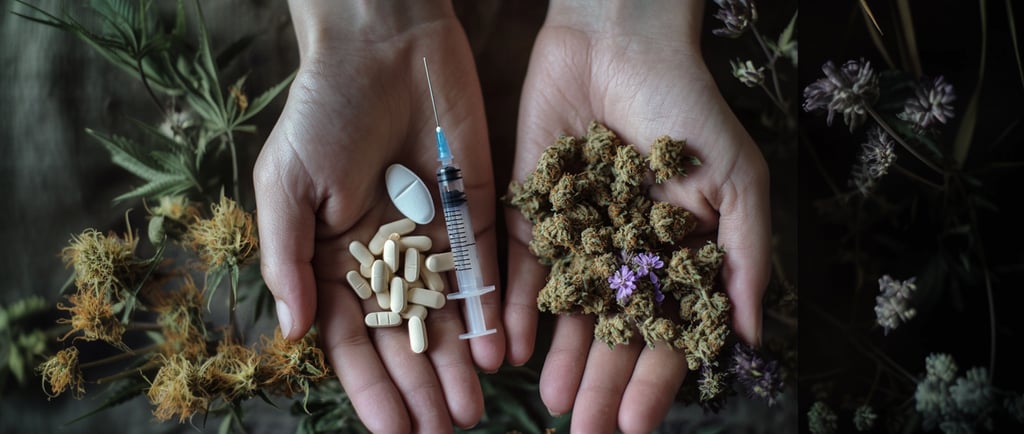The Role of RSO in Detox/Post-Detox Recovery
The Role of RSO in Post-Detox Recovery
Pete Aviles
12/5/20243 min read


Harm Reduction and Integration: The Role of RSO in Post-Detox Recovery
When discussing addiction recovery, one method that has gained recognition is the use of ibogaine as a rapid detox tool. Ibogaine is known for its ability to interrupt severe substance dependencies, often helping individuals detox in a matter of days. However, while ibogaine can effectively “reset” the body, the road to recovery truly begins in the integration phase—a time when individuals must adjust to a new way of life free from substances.
At our integration service, we adopt a harm reduction approach rather than rigid abstinence models like AA (Alcoholics Anonymous). While AA has helped many people, it’s our belief that addressing the physical and emotional needs of those recovering from addiction requires a more personalized, compassionate strategy. This includes utilizing alternative tools like cannabis extracts, specifically Rick Simpson Oil (RSO), to support the nervous system during the critical post-detox period.
Understanding Your Addiction and Reclaiming Authority Over Your Choices
A critical part of recovery involves not just addressing substance use but also deeply understanding your addiction and the role it plays in your life. This includes examining the influence of the pharmaceutical industry and recognizing that no external authority has power over your well-being unless you give it that power.
Holistic approaches should always be the first line of defense when addressing health issues, including recovery. Pharmaceuticals often come with a long list of negative side effects, and while they can be helpful in specific circumstances, it is essential to weigh these risks against their benefits. There’s wisdom in the saying: “For every illness, Mother Nature made a medicine.” Believing in the healing power of nature allows you to explore alternatives like RSO, herbal remedies, and dietary changes before considering pharmaceuticals. Taking charge of your decisions empowers you to choose what’s best for your body and spirit.
The Challenges of Post-Detox Recovery
One of the most significant hurdles people face after detoxing with ibogaine is managing the dysregulated nervous system that often follows years of substance use. These individuals frequently experience:
• Difficulty sleeping (insomnia or restless nights)
• Loss of appetite, leading to poor nutrition and weakness
• Heightened anxiety and emotional overwhelm
These symptoms can make early recovery feel unbearable, and unfortunately, many people relapse during this phase as they seek relief from the discomfort. This is why we focus on creating a supportive and manageable environment through harm reduction strategies.
The Role of RSO in Post-Detox Recovery
RSO (Rick Simpson Oil) is a full-spectrum cannabis extract with a high concentration of cannabinoids, including THC and CBD. Unlike smoking cannabis, RSO is typically ingested or used topically, offering a gentler, longer-lasting effect. Here’s why we find it valuable in recovery care:
1. Regulating the Nervous System:
Cannabinoids interact with the body’s endocannabinoid system, which helps regulate stress, mood, and overall nervous system balance. For someone with a dysregulated nervous system post-detox, RSO can provide a calming effect, reducing anxiety and promoting a sense of well-being.
2. Improving Sleep:
Sleep disturbances are common after detox, and poor sleep can hinder emotional and physical recovery. RSO, especially when taken in small doses, can promote restful sleep without the side effects of pharmaceuticals.
3. Enhancing Appetite:
Many people struggle to eat after detoxing, which further depletes their strength. RSO is well-known for its ability to stimulate appetite, helping individuals restore their energy levels through proper nutrition.
4. Pain and Discomfort Relief:
Detoxing from substances can leave the body in physical pain. RSO’s anti-inflammatory and analgesic properties can provide relief, making the recovery process more manageable.
Harm Reduction Over Abstinence
The traditional abstinence model often discourages the use of any substance, including cannabis. However, harm reduction recognizes that recovery isn’t a one-size-fits-all process. Our approach is rooted in the understanding that recovery is not just about abstaining from substances but about restoring balance, health, and agency to individuals’ lives.
Rather than stigmatizing the use of cannabis-based medicine, we view it as a tool for healing and empowerment. RSO, when used thoughtfully and responsibly, can help individuals reconnect with their bodies and minds, making it easier for them to transition into a healthier, substance-free life.
The Importance of Integration
Using ibogaine for detoxification is just the first step in the recovery journey. True healing requires integration—working through emotions, creating new habits, and finding stability. Cannabis extracts like RSO can act as allies during this time, providing relief and supporting the body’s natural healing processes.
It’s not about replacing one dependency with another; it’s about using tools that facilitate self-regulation, resilience, and restoration. This is what harm reduction is all about—empowering individuals to take small, meaningful steps toward lasting recovery.
Our Commitment to Your Recovery
At our integration service, we’re committed to helping individuals navigate the challenges of early recovery. Whether through harm reduction strategies, holistic practices, or compassionate care, we strive to create an environment where healing feels possible, even in the face of difficulty.
If you or a loved one are seeking support after detox, we’re here to help. Together, we can explore options that prioritize your well-being and honor your unique journey.
